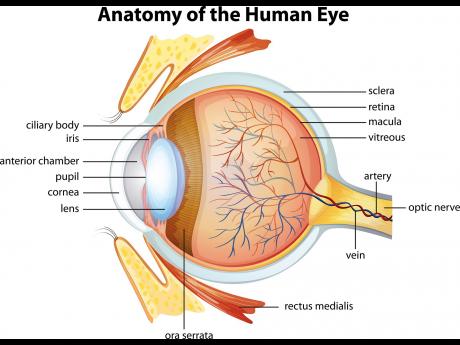Doctor’s Appointment | Watching out for cataracts
The best pictures in the world are taken by our eyes and the best views are seen by our windows to the world. Yet, for thousands of Jamaicans living with cataracts, the world only seems cloudy.
On the last episode of 'Doctor's Appointment', Dr. Neil McGill, ophthalmologist at the Kingston Public Hospital (KPH), sat with host Dr. Sara Lawrence to discuss the importance of eye health, with a special focus on cataracts.
Described by Dr McGill as an opacification of the lens or cloudiness of the lens in the eye, this condition makes it difficult to see. Comparing the lens of the eye to that of a classic film camera, he says that clarity is necessary in order for the eyes to focus an image on the back of the eye, on the retina, which he compared to the film of the camera that reacts to light sensitivity.
Poor night vision, cloudy or blurry vision, seeing faded colours, having issues with glare and having to change glasses frequently are a few of the symptoms and challenges faced by people living with cataracts.
TWO CATEGORIES
Divided into two categories, this disease can take on varying degrees of opaqueness. For instance, when a person has a mature or ripe cataract, the entire lens is cloudy, making sight close to impossible. While someone who has an immature cataract has clouding in certain parts of the eye.
Immature cataract is further separated into three types:
1. Nuclear cataracts, where the centre of the lens may be cloudy
2. Cortical cataracts, where the peripheral of the lens may be murky
3. Posterior subcapsular cataract, where the back of the lens is opacified.
What is more, the ophthalmologist also explains that this condition can even affect a person's refraction, so that if they were nearsighted, it may switch to far-sightedness and vice versa.
Dr. McGill said the condition is influenced by several factors, including age and complications from other maladies. People 40-50 or over are at a higher risk. Furthermore, a person living with a chronic illness, like diabetes, hypertension or who may suffer from severe eczema or muscle problems, can develop this condition. The use of certain drugs like steroids, excessive alcohol intake, and obesity can also increase the chances of developing the disease. Other factors include genes and trauma to the eye from a stab, shock or other foreign objects.
APPLY A FEW PRACTICAL TIPS
While not painful, Dr. McGill said cataracts can be prevented by applying a few practical tips, such as:
- Managing symptoms of chronic illnesses.
- Wearing sunglasses when exposed to the sun's rays.
- Wearing protective eyewear when doing tasks that may cause trauma to the eye.
- Quit smoking.
Yet, blindness is not inevitable. People living with this condition can get contact lenses, specific glasses or possibly do surgery to correct their sight.
LIVING WITH THE DISEASE
The 'appointment' continued as elderly, cataract patient Edward Grey joined the discussion to explain his experience living with the disease.
Having dimmed vision and observing the frequency with which he changed his glasses, Grey explained that he knew something was amiss when he could not see things clearly, so he consulted a doctor and was diagnosed.
Grey has been wearing glasses for some 13 years and said he now sometimes sees double vision. But Grey is not alone.
Dr McGill said when a patient like Grey, who is not seeing well, comes into the doctor's office, a vision test is done to identify the degree of blindness.
But surgery is not the first resort. He said that a person must qualify for surgery and if they don't, they are giving alternate options like using a magnifying glass or making environmental changes, such as increasing the brightness of light in the home. If these options prove futile, then surgery is employed.
During the surgery, the patient is not put to sleep, but the area around the eye is numbed and small incisions are made to remove the cloudy lens. Consequently, an artificial lens is placed in the eye and in most cases, the patient can go home right after. Following the surgery, the chances of the cataract forming again are very slim. Yet, the bag of the artificial lens may become opacified, causing posterior capsular opacity, but a laser can be used to clear that up.
VERY COMMON IN JAMAICA
Also present at last week's appointment was Geaton Porter, optical chain manager, Courts Optical. Starting its operations six years ago, and now boasting 11 locations islandwide, Courts Optical has been providing pre-screening eye tests and affordable eyewear for the nation's people since its inception.
Other services offered there include an autorefractor as well as blood sugar and blood pressure tests. Courts Optical specialises in sunglasses with ultraviolet A and B (UVA and UVB) protection, which can reduce the chances of having cataracts. Cataracts are very common in Jamaica, so caring for the eyes is crucial to maintaining healthy eyes. Remember, if you are affected by cataract, the most important thing is to take your medication and see your doctor regularly for eye examinations. Keep your windows to the world cloud-free and bright. The 6 p.m., Dr's Appointment Facebook live segment, season three's new feature, saw viewers interfacing with Dr McGill, getting their questions answered in real time.
- Join us next week Sunday at 5:30 p.m. on TVJ and Facebook live at 6 p.m. when we look at cervical cancer. 'Doctor's Appointment' is a family- and health-oriented television programme that is produced by Maverick Communications Limited.


